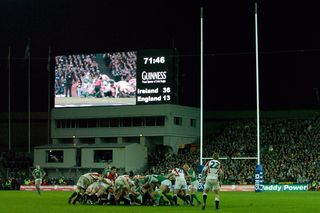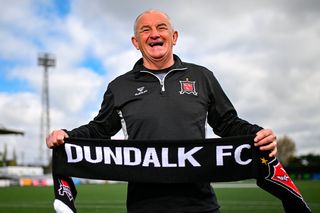Film - Stan and Ollie: Another fine mess
Forgotten stars: Stan Laurel and Oliver Hardy.
A British production company is planning a biopic of Laurel and Hardy. The film will be directed by Jon S Baird and based on a 1953 concert tour of Britain and Ireland: Steve Coogan is to play Stan Laurel, while John C Reilly will appear as Oliver Hardy.
By the early 1950s, the comic duo's movie career is over, and thanks to poor advice and unscrupulous studio bosses, they've fallen on hard times. Their British tour starts off badly, with audiences so small they begin to think they've already been forgotten. But as the concerts continue, their loyal fans emerge in droves to show Stan and Ollie just how much their comedy meant to them.
The casting of Coogan and Reilly in the lead roles sounds just about right, but all the same, I was rather ambivalent when I first heard the news. Mr Baird's previous credits include the offensive and dreadful 2013 comedy Filth: what if his Laurel and Hardy movie isn't any good?
Then there's the matter of Stan and Ollie's deceptively subtle and graceful routines, which even actors as good as Coogan and Reilly are capable of making a mess of. But overall, the news has to be good, because it has occurred to me many times in recent years that the comic duo are in serious danger of being forgotten.
When I was growing up in the 1970s, their faces were everywhere, even though both of them were dead by then. Their silent shorts and talkies were shown on television constantly, there was a cartoon strip based on their characters, and in 1975, Stan and Ollie even scored a posthumous top 10 hit when 'Trail of the Lonesome Pine' was released in the UK as a single (I wonder who made money out of that one - not them as usual).
People whistled their 'Cuckoo Song' theme tune at each other to imply stupidity, and catchphrases like "That's another fine mess you've gotten me into" were still part of the popular lexicon.
Not any more, however. I recently read that the last time the BBC showed a Laurel and Hardy film was 2005, and I'm sure the same is more or less true for RTÉ. In fact, it's entirely possible that there are people walking around in their teens and 20s who have no idea who they are. This idea seems tragic to me, because at their best, the boys were unique, special, and capable of moving and amusing you at one and the same time.
Their story's an unlikely one, their partnership even more so. It all began in 1912, when a young Lancashire-born comic called Arthur Stanley Jefferson travelled to America for a tour with a London music hall troupe that coincidentally also included one Charles Spencer Chaplin. Both men would remain in America, and gradually make their way to Hollywood.
Stanley was the child of theatre folk, and had grown up in awe of actors and the stage. He'd made his stage debut at 16, and worked up a routine based on the acts of leading music hall comedians of the time. His slender frame and puzzled look marked him out as a natural comic, but he wasn't perhaps quite distinctive enough to make a big splash on his own.
He was, however, a hard worker and a clever performer, and by 1917 had been offered his first movie part, in a two-reel silent comedy called Nuts in May. He first appeared on screen with Oliver Hardy in a film called The Lucky Dog, made in 1918 but not released until 1921. But Stan was the star, Ollie a bit player, and their combined potential went unspotted. They met again in the mid-1920s, by which time both were contracted to the Hal Roach Studios.
Their first proper film together was the 1926 short Putting Pants on Philip, a brisk and breezy affair in which they played a Scottish uncle and his nephew. It was hardly vintage stuff, but Leo McCarey saw that they were made for each other, and suggested they work together permanently.
McCarey, an inspired director of comedy who would go on to make such classics as Duck Soup, co-wrote Laurel and Hardy's next film together, and it was in The Second 100 Years that the 'Stan' and 'Ollie' characters first appeared. Their gormless but strangely elegant slapstick found instant appeal - it was the beginning of a partnership that would only end in death.
Born in Harlem, Georgia, Oliver Hardy had grown up steeped in the lore of the old South. His father was a Civil War veteran, and not best pleased when his outgoing son developed an interest in acting. By 18 Hardy was running the local cinema, and became convinced he could do a better job than some of the hams up on the screen.
He moved to Hollywood and became a competent and sought-after comic performer at the Roach Studios and elsewhere, but like Stan Laurel was a bit like a joke in search of a punchline - until he found his other half.
Though they would perform together until the mid-1950s, Laurel and Hardy's heyday was comparatively brief. After becoming a star act in the last days of the silent era, they survived and thrived in the transition to sound. Stan and Ollie's appeal was only enhanced by the microphones, as Hardy's rich southern drawl and Laurel's plaintive English whine added to the glaring physical contrast between them.
In the 1930s they became two of the biggest stars in Hollywood in a string of often brilliant 30-odd minute comedies that combined slapstick with moments of surprising elegance and grace. Pack Up Your Troubles, Babes in Toyland, Sons of the Desert and The Music Box among others contain some of the most disarmingly funny routines ever committed to film. But though they continued to make a series of commercially successful movies in the 1940s, they were considered inferior to their finest work, and their box office appeal began to decline.
Their popularity with the public, however, did not, and with the advent of television, their short films would become beloved staples on the network schedules. What has made their comedy endure I think, at least until now, is a very distinctive mix of emotion and madness. The seeming ease of their routine was in fact carefully worked out and meticulously planned by Laurel. It was he who came up with the bowler hats, their mutual gormlessness, and their touchingly childlike approach to the world. And he tirelessly rewrote routines and scripts to make sure they were up to scratch.
'Stan' and 'Ollie' were like some old married couple, who fought like cats and dogs but could never really fall out. Much of their comedy came from their failure to interact successfully with everyday objects and situations, and from the fact that although they were both terminal dimwits, Ollie considered himself quite the intellect. And Hardy, who had exquisite physical grace despite his excess weight, coined the wonderful tactic of breaking the fourth wall and gazing, exasperated, right into the camera.
Neither of them made much money for their trouble, mainly thanks to the unscrupulous Hal Roach. They fell out with Roach, but never with each other, and their close friendship persisted through financial troubles and their various marriages (Stan alone had five).
There's a few lovely clips of newsreel showing the pair arriving in Cork as part of that 1953 tour. And Laurel would later recall that, as they walked through Cobh, the church bells began to ring out their famous theme tune. "We both cried at the same time," Stan said, "because of the love we felt coming from everyone."
It was the jovial and easygoing 'Babe' Hardy who died first, of a stroke in 1957, at the age of 65. Stan Laurel was so depressed and broken by his friend's departure that he was unable to attend the funeral, commenting simply that "Babe would understand".
He vowed never to act again and he kept his promise, though he did welcome well-wishers and professional admirers like Jerry Lewis and Dick Van Dyke to his modest Santa Monica apartment. When he died in 1965, Van Dyke gave the eulogy and comic royalty like Buster Keaton turned out to see him off. On his grave are the words 'Stan Laurel - A Master of Comedy', which just about sums it up.
At his funeral, Keaton was overheard to remark that "Chaplin wasn't the funniest, I wasn't the funniest, this man was the funniest". But with respect to the great Keaton, I think he got it slightly wrong, because Stan was half of perhaps the funniest screen act of them all.
Sons of the Desert
There are lovely moments in other films, like that delightful dance in Way Out West or the piano delivery scene in The Music Box, but the 1933 feature Sons of the Desert has always been my favourite Laurel and Hardy film. The plot is simple, but brilliant. Stan and Ollie are members of a men-only Freemason-style organisation called the Sons of the Desert: they're about to hold their boisterous annual convention in Chicago, and the boys want to go. The only problem is their shrewish wives are unlikely to let them, so Oliver feigns a fever and suggests a trip to Hawaii with Stanley to recuperate.
Instead they go to the convention, and return to Los Angeles sporting garlands and singing 'Honolulu Baby'. What they don't know is that the ferry they were supposed to be on has sunk, and that their wives saw them waving into the camera on a cinema newsreel showing the Sons of the Desert's Chicago parade. It's a wonderful little film, full of lovely slapstick routines and some priceless dialogue. When Ollie feigns his illness and Stan calls for help, a vet turns up. "Why did you get a veterinarian?" Hardy asks his clueless friend. "Well I didn't think his religion would make any difference," Laurel replies.
Join the Irish Independent WhatsApp channel
Stay up to date with all the latest news














